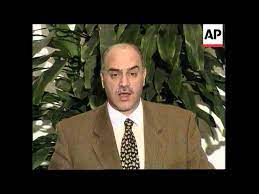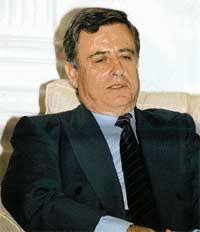Syrian Vice President Abdel Halim Khaddam expressed his admiration for the excellent and deepening brotherly relations between Syria and Bahrain. He emphasized the commitment of the leaders of both countries to further strengthen these relations in order to serve the interests of their nations and the causes of the Arab nation. Khaddam conveyed to a Bahraini media delegation, accompanying Minister of Information Tariq Abdulrahman Al-Moayyad during his official visit to the Syrian Arab Republic, the importance of increasing mutual visits among Arab countries to exchange experiences, coordinate efforts, consult together, and review achievements in the Arab world.
Regarding the current regional tension, Khaddam attributed it to the unfavorable international and Arab situation, which he believed benefits Israel and its attempts to capitalize on the upcoming Israeli elections. When asked about the possibility of Israel launching a military action against Syria, he stated that Syria would defend itself with all its capabilities, but anticipated significant losses on both sides. He emphasized that continued tension would not bring security to any party, while also expressing that a military escalation was not expected, although the timing of war is difficult to control.
Discussing the Damascus Declaration, Khaddam described it as a guideline to rectify the course of joint Arab action and emphasized that the current Arab situation should not be left as it is. He expressed that ruptures and divisions are not in the interest of Arabs and highlighted the qualifications of the eight countries involved in the Damascus Declaration to revive the Arab situation from its current state.
Regarding any aggression against Gulf states, Khaddam affirmed that Syria would stand against such aggression, emphasizing that any threatened or attacked Arab country should be supported collectively by all Arab nations.
It was noted in an article by Nabil Al-Hamar that Syrian Vice President Abdel Halim Khaddam is described as accurate, enthusiastic, fast-moving, a fierce negotiator, and someone whose point of view is difficult to change. Western journalists have provided various insightful descriptions of him. The office of the Syrian Vice President is located in the Al-Subki neighborhood in Damascus, occupying a two-story villa on the main street. During a meeting with Minister of Information Tariq Abdulrahman Al-Moayyad and the media delegation, Khaddam expressed his regret that their visit was coming to an end and encouraged them to stay longer to experience more of Damascus.
Minister Tariq Al-Moayyad expressed gratitude for the generosity and warmth extended to them during the short visit, assuring Khaddam that it was a prelude to future visits to the beautiful country.
The Syrian Vice President inquired about His Highness the Amir, His Highness the Prime Minister, and His Highness the Crown Prince, expressing his greetings and affection for them through the Minister of Information. He discussed the bilateral relations between Syria and Bahrain, emphasizing the importance of strengthening these relations to serve the interests of both brotherly nations. He described the relations as excellent, highlighting their deepening and growing strength. The leaders of both countries are committed to sustaining these relations to benefit their respective nations and the Arab causes. He stressed the need for increased mutual visits among Arab countries to facilitate the exchange of experiences, coordination, joint consultations, and knowledge sharing regarding achievements in the Arab world.
Regarding the current tension in the region, Khaddam attributed it to the unfavorable international and Arab situation, with Israel benefiting from this situation and seeking gains linked to the upcoming Israeli elections. He pointed out that the disintegrating Arab situation presents an opportunity for aspiring parties, calling for unified Arab action to counter such aspirations. He further noted that Israel, particularly after the collapse of the Soviet Union, aims to create an imaginary enemy for the West. Syria, he stated, is now committed to the path of peace and making genuine efforts in this regard.
When asked about the possibility of Israel initiating a military action against Syria, Khaddam affirmed that Syria would defend itself with all its capabilities. However, he acknowledged that significant losses would occur on both sides and emphasized that continued tension would not bring security to any party. He did not anticipate a military explosion but mentioned the difficulty in controlling the cessation of war once it begins. Khaddam added that Israel’s escalation aims to serve electoral goals and to maintain tension among Israelis, providing an advantage to extremist factions during elections. He stated that Israel does not genuinely seek peace and that its falsehoods were exposed when peace negotiations were on the table, leading to international pressure.
Concerning the Damascus Declaration, Khaddam regarded it as a guideline to correct the course of joint Arab action, emphasizing the need to address the current unfavorable Arab situation. He highlighted the detrimental effects of rupture and division and emphasized that the eight countries involved in the Damascus Declaration possess the necessary qualifications to revive Arab action from its current state. Khaddam stated that Syria would stand against any aggression targeting the Gulf states, as any threatened or attacked Arab country should receive collective support. He described the Damascus Declaration as a Gulf and Arab necessity, serving the interests of both a specific state and the Arab nation as a whole, as it remains open to all.
Regarding the role of media in the current phase faced by the Arab nation, Khaddam emphasized its importance and the potential dangers it carries. He highlighted the media’s ability to strengthen Arab relations and support solidarity among Arab countries. The media, he explained, serves as a channel that can connect Arab peoples and enhance their connections, being the closest medium to citizens. He likened the media to a warrior army, stating that if the battle is won, the country emerges victorious, emphasizing its central role. He stressed the significance of national media and expressed hope for expanded media cooperation in all fields.


